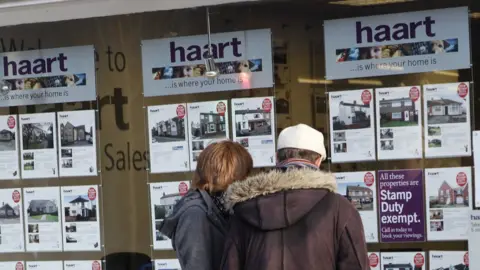Letting agents turn away tenants on housing benefits
Letting agents are discriminating against tenants on housing benefit, an undercover investigation has found.
Shelter and the National Housing Federation found one in 10 agents in England refused to let to those on the benefit.
The undercover investigation found the policy was enforced even if tenants could afford the rent.
Stephen Tyler told the BBC that housing benefit discrimination had forced him to sleep in his car.
The wheelchair user told the BBC's Victoria Derbyshire programme: "We have been trying to find accommodation since we were evicted from our last property when we asked for adaptations to be made for wheelchair access.
"I phone anything up to 20 landlords, estate agents, a day and none of them will accept DSS (tenants on Department of Social Security housing benefits)."
The Birmingham resident said he had approached his council as well as housing associations, but "no one wants to help at all".
A spokesman for Mr Tyler's local council, Birmingham City, said it had offered him "suitable alternative accommodation". It added: "While this is far from an ideal situation, and is no doubt distressing for Mr Tyler and his family, unfortunately we are faced with a national housing crisis that is affecting an unprecedented number of families across the region."
Ugly undercurrent
Polly Neate, chief executive of Shelter, said: "This ugly undercurrent of discrimination is wreaking havoc on hundreds of thousands of people's lives. 'No DSS' is an outdated and outrageous example of blatant prejudice."
The investigation into 149 regional letting agent branches found five of England's leading letting agents were discriminating against tenants on housing benefit, with Haart was the worst offender..
 Getty Images
Getty ImagesMystery shoppers, deployed by the charities, had encountered a ban on housing benefit tenants in eight out of 25 Haart branches.
A spokesman for Haart said: "It is not our policy to refuse housing benefit tenants - anyone who passes referencing checks is able to rent properties listed with our branches. We do regularly arrange tenancies for those claiming housing benefits and currently have 112 tenancies where this is the case.
"This research has brought to light that some of our branches are misinformed and we are working to ensure that this policy is being followed across our network. We are sorry for any occasion where this has not been the case."
Branch policies
Others named as having individual branch policies not to accept people on housing benefit were Bridgfords (two out of 25 branches visited), Dexters (two out of 25), Fox & Sons (two out of 24) and Your Move (one out of 25).
Almost half of all branches called during the investigation said they had no suitable homes or landlords willing to let to someone on housing benefit, the report said.
The report claims that a shortfall in social housing means that an estimated 1.64 million adults rely on housing benefit to help cover private rents.
It said the majority were women, and especially single mothers with childcare responsibilities, while people who receive disability benefits were three times more likely to need a housing benefit top-up.
David Cox, chief executive of letting agents' body Arla Propertymark, said: "Rents are paid in advance, whereas housing benefit is paid in arrears, and therefore with such a shortage of rental accommodation, landlords and agents will naturally choose a tenant who can pay the rent when it is due, rather than a tenant who is always a month in arrears.
"We have called on government time and time again to resolve this problem. But our calls have fallen on deaf ears.
A Ministry of Housing spokesman said those on housing benefit who felt discriminated against could complain to redress schemes, which all letting and managing agent must be part of by law.
He added: "We are determined to tackle stigma in social housing and the private rented sector. Just last week we published our Social Housing Green Paper setting out our plans to rebalance the relationship between tenants and landlords."
